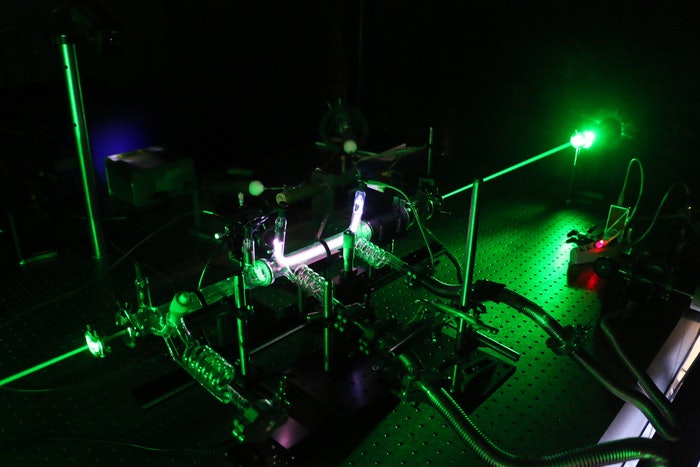
Scientists are currently working on a proof of concept for a way to make oxygen, fertilizer, and fuel on Mars — a technological leap that could make human habitation on Mars viable.
Physicist Vasco Guerra from the University of Lisbon studies plasma, that fascinating substance achieved by exciting gas into a more extreme phase. Guerra tells Inverse that his team has received favorable attention from the European Space Agency (ESA). With funding from ESA and other institutions, Guerra’s team can fine-tune the science of their reactor, and optimize the device to make it small and light, the ideal characteristics for anything that must jettison off Earth for a months-long interplanetary trip.
What’s new — Their invention would use artificial plasma to break apart carbon dioxide in Mars’ atmosphere and transform it into oxygen for breathing and nitrous oxide for fertilizing crops. Guerra discusses this integrated system and their preliminary results in a new paper published Wednesday in the Journal of Applied Physics.
It’s not complicated to generate plasma, Guerra says, describing the technology as a complicated version of fluorescent light. To work, it would just need solar panels to collect energy, an electric generator to ignite the plasma, and adapted membranes to filter the oxygen out of carbon dioxide and away from the dangerous by-product carbon monoxide. Any human journey to Mars will require breathable air for the crew, and Guerra says that this potential future destination for humanity offers good starting conditions for the plasma concept to work. The Red Planet is abundant in carbon dioxide, Guerra says, and its low atmospheric pressure would facilitate the process.

How it works — Solids, liquids, and gasses are the three commonly-known phases of matter, and they progress by order of heat. Ice becomes water when warmed up, and a pot of tea turns into steam when sitting over a flame. Plasma is what happens if you keep heating the system, breaking more bonds, and removing electrons from the nuclei.
“These free electrons, because they are charged, can be accelerated by magnetic fields and gain a lot of energy,” Guerra says. “Once you have these electrons that can be accelerated and gain energy, then what we say is that plasma is selective, meaning that we can transfer this energy to the outcome we desire. And that’s the magic of it. You can do almost anything with a plasma of this type.”
In this case, the energy of the electrons is channeled towards carbon dioxide — which is 96 percent of Mars’ atmosphere — breaks those molecules and disassociates the oxygen.
Why it matters — The first utility of oxygen is breathing, obviously. But it can also be used for the production of fuels for a rocket and for fertilizer. Nitrogen from Mars’ atmosphere could be combined with the dissociated oxygen to produce the base components of fertilizer.
Inverse asked Guerra if his invention could benefit us here on Earth. After all, one major draw for its applications on Mars is that the device would operate in a closed system. Guerra says that others have looked at a way to use carbon dioxide as a natural resource on Earth to make zero-emissions fuel. Guerra dabbled into this topic in the past, but realized it would be hard to achieve here. Mars’ atmospheric pressure is ideal for this plasma technology, meaning the approach would require more energy to achieve on our planet. “The efficiency that you need to make it profitable is more challenging I would say on Earth than on Mars.”
But it’s not impossible. “Of course Mars is exciting… it makes us dream, which is also important,” Guerra says. “But the technology can be applied and have an impact much before sending a machine to Mars… on the research that’s being done on Earth to tackle climate change.”







